Summary | Excerpt | Reading Guide | Reviews | Beyond the book | Read-Alikes | Genres & Themes | Author Bio

For readers of Akhil Sharma, Mohsin Hamid, and Teju Cole, a haunting, masterly novel about a family splintered by success in rapidly changing India.
A young man's close-knit family is nearly destitute when his uncle founds a successful spice company, changing their fortunes overnight. As they move from a cramped, ant-infested shack to a larger house on the other side of Bangalore, and try to adjust to a new way of life, allegiances realign; marriages are arranged and begin to falter; and conflict brews ominously in the background. Things become "ghachar ghochar" - a nonsense phrase uttered by one of the characters that comes to mean something tangled beyond repair, a knot that can't be untied. Elegantly written and punctuated by moments of unexpected warmth and humor, Ghachar Ghochar is a quietly enthralling, deeply unsettling novel about the shifting meanings - and consequences - of financial gain in contemporary India.
Brilliantly translated by Srinath Perur, Ghachar Ghochar is a finely narrated epic in every way – it’s a slim novel that packs a punch and is a true heavyweight in all the ways that matter...continued
Full Review
(685 words)
This review is available to non-members for a limited time. For full access,
become a member today.
(Reviewed by Poornima Apte).
 In Ghachar Ghochar, the narrator lives in a joint family, and it is really this sociological unit that has been the mainstay of Indian life for centuries.
In Ghachar Ghochar, the narrator lives in a joint family, and it is really this sociological unit that has been the mainstay of Indian life for centuries.
A joint family is defined as a unit of extended members of a family all living together under one roof, who also cook and eat together. Usually driven by patriarchal order, the patriarch and his wife and sons and their wives and children and so on form one group. A joint family is compared to socialism where each contributes according to ability and takes according to need. One of the common negatives against a joint family, is that it contributes to people being slackers. The narrator in Ghachar Ghochar for example, simply mooches off the family's collective earnings without ...
This "beyond the book" feature is available to non-members for a limited time. Join today for full access.

If you liked Ghachar Ghochar, try these:

by Neel Mukherjee
Published 2019
What happens when one attempts to exchange the life one is given for something better? Can we transform the possibilities we are born into?

by Neel Mukherjee
Published 2015
Ambitious, rich, and compassionate, The Lives of Others is a novel of unflinching power and emotional force which anatomizes the soul of a nation as it unfolds a family's history.
Courage - a perfect sensibility of the measure of danger, and a mental willingness to endure it.
Click Here to find out who said this, as well as discovering other famous literary quotes!